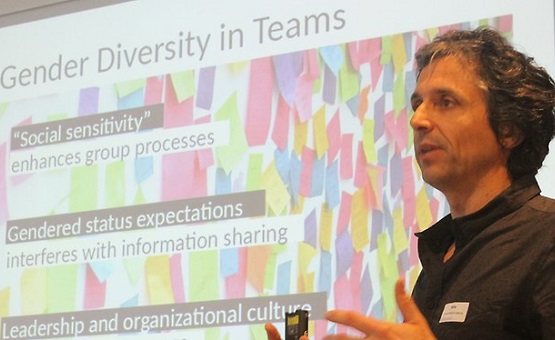The results and implications of the GEDII project have been presented in a workshop held in Berlin on 12 and 13 July 2018. Gender Diversity Impact (GEDII) is a Horizon 2020 project coordinated by GenTIC’s researcher Jörg Müller, which aims to provide new concepts and methods for researching the impact of gender diversity on the productivity, quality, and innovation of research groups.
In this final workshop, Jörg Müller presented the results of the research based on sociometric badges, a type of sensors developed by the Massachusetts Institute of Technology in 2010. The anonymized data collected during a week in which research team members carried the sensor throughout the working day provided information about body movement, the tone of voice and the type of relationships that take place within the group in a temporal traceable fashion. Preliminary results suggest that in well-balanced teams, where less emphasis is placed on hierarchy and power, the most productive contributions come from all team members, not just those with more power. This can positively influence both the research and the ability to innovate. In teams where hierarchy is more salient the contributions of those with higher status will prevail in the group.
On the other hand, Anne Laure Humbert, director of the Centre for Diversity Policy Research and Practice at Oxford Brookes University, and Elisabeth Anna Günther, social scientist, presented the Gender Diversity Index developed by the GEDII project. As a starting point for analyzing our own team, GEDII has created a self-assessment tool available to the public, which can give an initial idea of what is our position in the Gender Diversity Index.
Finally, Ulf Sandström and Sandra Klatt, researchers at Örebro University (Sweden) and Hochschule Furtwangen University (Germany) respectively, offered an overview of the results of a comparative, quantitative study to measure the impact of gender diversity in research and innovation performance.
The GEDII workshop included two keynote presentations by professors Reinhilde Veugelers (Faculty of Economics and Business at KU Leuven) and Marieke van den Brink (Gender & Diversity Faculty of Social Sciences at Radboud University Nijmegen). A panel of invited experts discussed the implications of the GEDII research findings for use in research management, human resource management, and research and science policymaking as well as on gender equality policies in science.
In the autumn of 2018, the GEDII project will be completed and the results will be made available to the European Commission and the interested public.
You can download the programme of the event in this link.
